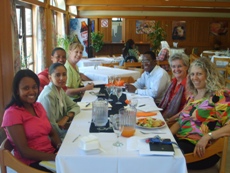|
The first external evaluation of the IADP- Affordable Access
Project took place in April 2008. Colin Jacobs from the British
COuncil conducted the evaluation. Ephraim Mhlanga provides feedback
on his site visit to the University of the Western Cape.
Programme Objectives
The central objective of the International
Association for Digital Publications (IADP) Affordable Access
Programme is to improve the training and effectiveness of people
who work, or intend to work, in support of poor communities, including
agricultural extension officers, in-service teachers, nurses, social
workers, and doctors who practice telemedicine.
The work programme specifically aims to facilitate the collaborative
development and use of open access e-learning courseware at selected
universities, and to provide affordable access to digital publications.
It also supports the procurement and configuration of low-cost computers
and e-book readers, including the design and deployment of systems
to ensure ease of use and compatibility.
Visit to UWC
In the week commencing Monday 21st April, Colin Jacobs visted the
three participating universities to conduct interviews with staff
and students. This article captures the evaluation experience at
the University of Western Cape (UWC), the first institution he visited.
At this university, Colin was treated to a warm welcome by Shirleen
Langenhoven, the institutional project manager. During the course
of the day, Colin met with Juliet Stoltenkamp (manager ICT) and
her support team, a group of 40 Social Work students participating
in the project, Professor Vivian Bozalek, the academic implementing
the project with Social Work students and recently appointed director
for teaching and learning in the university, as well as Professor
Brian O’Connell, the Rector of the university.
UWC Rector’s Vision
Brian O'Connell explained his passion for projects that aim at reaching
marginalised groups, as a way of bridging the knowledge gap that
exists between the historically disadvantaged South Africans and
the developing societies. Professor O'Connell believes in the potential
for ICTs to reach large numbers of students in the process of learning
and developing a culture of searching for solutions to problems
of disease and poverty through science. He perceives the challenge/role
of an African university as that of operating in a context where
communities are generally divorced from the culture of reading and
searching for scientific knowledge even outside formal education
institutions. The key role of the South African university, then,
is to cultivate this culture in local communities, especially amongst
the youth; it’s a new culture and it requires innovative efforts
to transmit it.
He bemoans the educational damages that were caused to South African
society by the apartheid system and believes that after the Soweto
Student Uprisings of 1976, no meaningful education took place in
the majority of the Black schools in the country, and this perpetuated
the already existing knowledge gap that was caused by many years
of the apartheid system. This needed to be addressed in the post-1994
era. Unfortunately, in his view, the outcomes-based curriculum further
worsened the situation because it was devoid of science and mathematics,
and so the knowledge gap continued to widen. It is this very gap
that is his major cause for concern, as he believes that there is
no stock to replace the current generation of academics when they
retire. This spells out the critical importance and urgency for
innovative ways of addressing educational issues if South Africa
is to protect its space in the global knowledge community. In his
view, the role of ICTs as one of the potent ways of addressing this
need cannot be over-emphasised.
IADP Experience in Year One
As Rector, Professor O'Connell houses about six projects in his
office that he believes are significant innovations aimed at addressing
knowledge issues, and IADP fits very well within the broader vision
for the University, hence the support it enjoys directly from his
office. Through his leadership and commitment, UWC used its first
experience with the first group of Social Work students in 2007
as a learning encounter. As was confirmed by the current group of
participating students, most of the problems faced in 2007 have
been overcome:
- Access has greatly improved due to new devices that have been
purchased by the university,
- There is wireless connectivity on campus,
- The IT department offers initial training and ongoing support
to students; and the same department has also developed an IT
toolkit which is user-friendly to students and staff alike.
The IADP project now flows smoothly at the university and is poised
for expansion to include other groups of students and staff. From
the students’ perspective, some of the benefits of the project
are that:
- It has improved their time management skills and they are now
more independent in learning,
- Students do not have to buy some of the key books they need
any more and they can access latest editions of books online,
- Students find it convenient to have own computers at home as
this enables them to meet their assignment deadlines,
- Having computers eases their communication with lecturers.
There is no doubt that UWC is a site where the IADP project has
started yielding benefits to the participating group of students.
The UWC model is an example worth emulating and it is hoped that
the university has much to share with other project institutions.
| 
